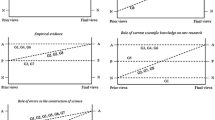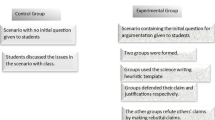Abstract
This research analyses what happens when a critical reading activity based on a press article dealing with an energy-related problem is implemented with two groups of students of 13–14 years old and 16–17 years old in the same school (a total of 117 students). Specifically, the research analyses the students’ profiles from the standpoint of their attitudes to the information given in the news story and the use they make of it when writing an argumentative text. It also analyses the difficulties the students have when it comes to applying their knowledge about energy in a real-life context. Lastly, some strategies are suggested for helping students to critically analyse the scientific content of a newspaper article. Three reader profiles were identified (the credulous reader, the ideological reader and the critical reader). No significant differences were found in reading profiles in terms of age or scientific knowledge. The findings show that the activity helped to link science learning in school with facts relating to an actual context, particularly in the case of students with more science knowledge.


Similar content being viewed by others
References
Aikenhead, G. S. (2005). Science-based occupations and the science curriculum: concepts of evidence. Science Education, 89(2), 242–275.
Butler, B. (1995). Using WWW/Mosaic to support classroom-based education: an experience report. Interpersonal Computing and Technology Journal, 3(1), 17–52.
Bybee, R. W. (1991). Planet earth in crisis: how should science educators respond? The American Biology Teacher, 53(3), 146–153.
Chisholm, D., Kerr, R., & Jardine, P. (1992). Some energetic thoughts. Physics Education, 27, 215–220.
Clark, D. B., & Slotta, J. D. (2000). Evaluating media-enhancement and source authority on the Internet: the knowledge integration environment. International Journal of Science Education, 22(8), 859–871.
Dawson, V., & Venville, G. J. (2009). High-school students’ informal reasoning and argumentation about biotechnology: An indicator of scientific literacy? International Journal of Science Education, 31(11), 1421–1445.
Domenech, J. L., Gil-Pérez, D., Gras-Martí, A., Guisasola, J., Martínez, J., Salinas, J., et al. (2007). Teaching of Energy Issues: a Debate Proposal for a Global Reorientation. Science Education, 16, 43–64.
Driver, R., Newton, P., & Osborne, J. (2000). Establishing the norms of scientific argumentation in classrooms. Science Education, 84(3), 287–312.
Duit, R. (1987). Should energy be illustrated as something quasi-material? International Journal of Science Education, 9, 139–145.
Duit, R. (1986). In search of an energy concept. In R. Driver, & R. Millar, (Eds.), Energy Matters. Proceedings of an invited conference. Teaching about energy within the secondary science curriculum (pp. 67-101). Leeds: University of Leeds.
Duschl, R. (1990). Restructuring science education the importance of theories and their development. New York: Teachers College Press.
Duschl, R. A., & Osborne, J. (2002). Supporting and promoting argumentation discourse in science education. Studies in Science Education, 38, 39–72.
Erduran, S., Osborne, J., & Simon, S. (2005). The role of argument in developing scientific literacy. In K. Boersma, O. de Jong, H. Eijkelhof, & M. Goedhart (Eds.), Research and the quality of science education (pp. 381-394). Dordrecht: Kluwer.
Gilbert, J. K., Bulter, A. M. W., & Pilot, A. (2011). Concept development and transfer in context-based science education. International Journal of Science Education, 33(6), 817–837.
Gott, R., & Duggan, S. (1996). Practical work: its role in the understanding of evidence in science. International Journal of Science Education, 18(7), 791–806.
Gott, R., Duggan, S., & Roberts, R. (1999). Understanding scientific evidence. http://www.dur.ac.uk/ded0www/evidence_main1.htm.
Halkia, K. R., & Mantzouridis, D. (2005). Students’views and attitudes towards the communication code used in press articles about science. International Journal of Science Education, 27(12), 1141–1395.
Hinrichs, R., & Kleinbach, M. (2002). Energy: its use and the environment. New York: Thomson Learning.
Jarman, R., & McClune, B. (2002). A survey of the use of newspapers in science instruction by secondary teachers in Northern Ireland. International Journal of Science Education, 24(10), 997–1020.
Jiménez-Aleixandre, M. P., & Erduran, S. (2008). Argumentation in science education: an overview. In S. Erduran & M. P. Jimenez-Aleixandre (Eds.), Argumentation in science education: perspectives from classroom-based research (pp. 3–28). Dordrecht: Springer.
Jiménez-Aleixandre, M. P., & Gallástegui-Otero, J. R. (1995). “Let’s save energy!”: incorporating an environmental education dimension in the teaching of energy. Environmental Education Research, 1(1), 75–83.
Jiménez-Aleixandre, M. P., Bugallo Rodríguez, A., & Duschl, R. A. (2000). “Doing the Lesson” or “Doing Science”: argument in high school genetics. Science Education, 84(6), 757–792.
Kaper, W. H., & Goedhart, M. J. (2002). Forms of Energy, an Intermediary Language on the Road to Thermodynamics? Part I. International Journal of Science Education, 24(1), 81–95.
Korpan, C. A., Bisanz, G. L., Bisanz, J., & Henderson, J. M. (1997). Assessing literacy in science: evaluation of scientific news briefs. Science Education, 81, 515–532.
Kortland, K. (1996). An STS case study about students’ decision making on the waste issue. Science Education, 80, 673–689.
Kuhn, D. (1991). The skill of argument. Cambridge: Cambridge University Press.
Kuhn, D., & Udell, W. (2003). The development of argument skills. Child Development, 74(5), 1245–1260.
Lawson, A. (2003). The nature and development of hypothetico-predictive argumentation with implications for science teaching. International Journal of Science Education, 25(11), 1387–1408.
Lemke, J. (1990). Talking science: language, learning, and values. Norwood: Ablex.
Linn, M. C. (2000). Designing the knowledge integration environment. International Journal of Science Education, 22(8), 781–796.
Martins, I., Mortimer, E., Osborne, J., Tsatarelis, C., & Jimenez-Aleixandre, P. (2001). Rhetoric and science education. In A. Behrendt et al. (Eds.), Research in Science Education, Past, Present and Future (pp. 189–198). Netherlands: Kluwer Academic.
McClune, B., & Jarman, R. (2010). Critical reading of science-based news reports: establishing a knowledge, skills and attitudes framework. International Journal of Science Education, 32(6), 727–752.
McClune, B., & Jarman, R. (2011). From aspiration to action: a learning intentions model to promote critical engagement with science in the print-based media. Research in Science Education, 41, 691–710.
McNeill, K., & Krajcik, J. (2008). Scientific explanations: characterizing and evaluating the effects of teachers’ instructional practices on student learning. Journal of Research in Science Teaching, 45(1), 53–78.
McNeill, K. L. (2011). Elementary students’ views of explanation, argumentation, and evidence, and their abilities to construct arguments over the school year. Journal of Research in Science Teaching, 48(7), 793–823.
Millar, R. (2000). Energy. In D. Sang (Ed.), Teaching secondary physics (pp. 1–43). London: John Murray.
Millar, R., & Osborne, J. F. (Eds.). (1998). Beyond 2000: Science education for the future. London: King’s College London.
Millar, R. (2005). Teaching about energy. Department of Educational Studies: Research Paper 2005/11. York: University of York. http://www.york.ac.uk/depts/educ/research/ResearchPaperSeries/Paper11Teachingaboutenergy.pdf
Monk, M., & Osborne, J. (1997). Placing the history and philosophy of science on the curriculum: a model for the development of pedagogy. Science Education, 81, 405–424.
Nicolaidou, I., Kyza, E. A., Terzian, F., Hadjichambis, A., & Kafouris, D. (2011). A framework for scaffolding students’ assessment of the credibility of evidence. Journal of Research in Science Teaching, 48, 711–744.
Nordine, J., Krajcik, J., & Fortus, D. (2011). Transforming energy instruction in middle school to support integrated understanding and future learning. Science Education, 95(4), 670–699.
Norris, S. P., & Phillips, L. M. (1987). Explanations of reading comprehension: schema theory and critical thinking theory. Teachers College Record, 89, 281–306.
Norris, S. P., & Phillips, L. M. (2003). How literacy in its fundamental sense is central to scientific literacy. Science Education, 87, 224–240.
Oliveras, B., Márquez, C., & Sanmartí, N. (2013). The use of newspaper articles as a tool to develop critical thinking in science classes. International Journal of Science Education, 35(6), 885–905.
Olson, D. R. (1994). The world on paper. Cambridge: Cambridge University Press.
Osborne, J. F., Erduran, S., & Simon, S. (2004). Enhancing the quality of argument in school science. Journal of Research in Science Teaching, 41(10), 994–1020.
Papadouris, N., Constantinos, P., & Kyratsi, N. (2008). Sttudents’ use of the model to account for changes in physical systems. Journal of Research in Science Teaching, 45(4), 444–469.
Phillips, L. M., & Norris, S. P. (1999). Interpreting popular reports of science: what happens when the reader’s world meets the world on paper? International Journal of Science Education, 21(3), 317–327.
Pintó, R., Couso, D., & Gutierrez, R. (2005). Using research on teachers’ transformations of innovations to inform teacher education: the case of energy degradation. Science Education, 89(1), 38–56.
Ratcliffe, M. (1996). Adolescent decision-making, by individuals and groups, about science-related societal issues. In G. Welford, J. Osborne, & P. Scott (Eds.), Research in Science Education in Europe (pp. 126–140). London: Falmer Press.
Ratcliffe, M. (1999). Evaluation of abilities in interpreting media reports of scientific research. International Journal of Science Education, 21(10), 1085–1099.
Ratcliffe, M., & Grace, M. (2003). Science education for citizenship: teaching socio-scientific issues. Philadelphia: Open University Press.
Reiser, B. J. (2004). Scaffolding complex learning: the mechanisms of structuring and problematizing student work. Journal of the Learning Sciences, 13(3), 273–304.
Sadler, T. (2004). Informal reasoning regarding socioscientific issues: a critical review of the research. Journal of Research in Science Teaching, 41(5), 513–536.
Sampson, V., & Clark, D. (2008). Assessment of the ways students generate arguments in science education: current perspectives and recommendations for future directions. Science Education, 92, 447–472.
Sandoval, W. A., & Çam, A. (2011). Elementary children’s judgments of the epistemic status of sources of justification. Science Education, 95(3), 383–408.
Sandoval, W. A., & Millwood, K. A. (2005). The quality of students’ use of evidence in written scientific explanations. Cognition and Instruction, 23(1), 23–55.
Schmid, G. B. (1982). Energy and its carriers. Physics Education, 17, 212–218.
Sexl, R. U. (1981). Some observations concerning the teaching of the energy concept. European Journal of Science Education, 3(3), 285–289.
Simmoneaux, L. (2001). Role-play or debate to promote students’ argumentation and justification on an issue in animal transgenesis. International Journal of Science Education, 23(9), 903–928.
Toulmin, S. E. (1958). The uses of argument. Cambridge: Cambridge University Press.
Trumper, R. (1991). Being constructive, an alternative approach to the teaching of the energy concept (II). International Journal of Science Education, 13(1), 1–10.
Tytler, R., Duggan, S., & Gott, R. (2001). Dimensions of evidence, the public understanding of science and science education. International Journal of Science Education, 23(8), 815–832.
Warren, J. W. (1983). Energy and its carriers: a critical analysis. Physics Education, 18, 209–212.
Wellington, J. (1991). Newspaper science, school science: friends or enemies? International Journal of Science Education, 13(4), 363–372.
Wu, H. K., & Hsieh, C. E. (2006). Developing sixth graders’ inquiry skills to construct explanations in inquiry-based learning environments. International Journal of Science Education, 28(11), 1289–1313.
Yang, F. G. (2004). Exploring high school students’ use of theory and evidence in an everyday context: the role of scientific thinking in environmental science decision-making. International Journal of Science Education, 26(11), 1345–1364.
Yang, F. Y., & Anderson, O. R. (2003). Senior high school students’ preference and reasoning modes about nuclear energy use. International Journal of Science Education, 25, 221–244.
Yore, L. D., Craig, M. T., & Maguire, T. O. (1998). Index of science reading awareness: an interactive constructive model, text verification, and grades 4–8 results. Journal of Research in Science Teaching, 35, 27–51.
Zohar, A., & Nemet, F. (2002). Fostering students’ knowledge and argumentation skills through dilemmas in human genetics. Journal of Research in Science Teaching, 39(1), 35–62.
Zoller, U., Ben-Chaim, D., Pentimalli, R., & Borsese, A. (2000). The disposition towards critical thinking of high school and university science students: an inter–intra Israeli–Italian study. International Journal of Science Education, 22, 571–582.
Acknowledgments
This study is based on work supported by Spanish MCYT grant EDU-2012-38022-C02-02 and Catalan PRI 2009SGR1543. The authors thank the teachers and students involved in the research.
Author information
Authors and Affiliations
Corresponding author
Rights and permissions
About this article
Cite this article
Oliveras, B., Márquez, C. & Sanmartí, N. Students’ Attitudes to Information in the Press: Critical Reading of a Newspaper Article With Scientific Content. Res Sci Educ 44, 603–626 (2014). https://doi.org/10.1007/s11165-013-9397-3
Published:
Issue Date:
DOI: https://doi.org/10.1007/s11165-013-9397-3




